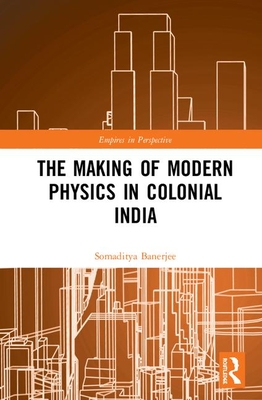

 Routledge
Routledge
The Making of Modern Physics in Colonial India


Key Metrics
- Somaditya Banerjee
- Routledge
- Hardcover
- 9781472465535
- 9.21 X 6.14 X 0.56 inches
- 1.08 pounds
- History > Modern - General
- English
 Secure Transaction
Secure TransactionBook Description
This monograph offers a cultural history of the development of physics in India during the first half of the twentieth century, focusing on Indian physicists Satyendranath Bose (1894-1974), Chandrasekhara Venkata Raman (1888-1970) and Meghnad Saha (1893-1956). The analytical category bhadralok physics is introduced to explore how it became possible for a highly successful brand of modern science to develop in a country that was still under colonial domination. The term Bhadralok refers to the then emerging group of native intelligentsia, who were identified by academic pursuits and manners. Exploring the forms of life of this social group allows a better understanding of the specific character of Indian modernity that, as exemplified by the work of bhadralok physicists, combined modern science with indigenous knowledge in an original program of scientific research.
The three scientists achieved the most significant scientific successes in the new revolutionary field of quantum physics, with such internationally recognized accomplishments as the Saha ionization equation (1921), the famous Bose-Einstein statistics (1924), and the Raman Effect (1928), the latter discovery having led to the first ever Nobel Prize awarded to a scientist from Asia. This book analyzes the responses by Indian scientists to the radical concept of the light quantum, and their further development of this approach outside the purview of European authorities. The outlook of bhadralok physicists is characterized here as cosmopolitan nationalism, which allows us to analyze how the group pursued modern science in conjunction with, and as an instrument of Indian national liberation.
Author Bio
Somaditya (Soma) Banerjee has a bachelors and masters in physics, completed graduate work in history of science and technology from the University of Minnesota and finally earned his doctorate in history from the University of British Columbia. He works with his brilliant colleague David Rands to make Austin Peay a center of excellence in Asian Studies. Soma’s research interests are in Modern South Asian History and History of Science and he is completing a book manuscript (under contract with Routledge Press) which examines the making of modern physics in colonial India. He has participated in several national and international conferences and received several institutional research grants and awards. He also reviews book manuscripts and journal articles for various publishers. He is the Faculty Advisor for Phi Alpha Theta (which won the best chapter award in 2019 for the 11th consecutive time), History Club and the newly created India Club at Austin Peay and currently teaches Early and Modern World History, Historical Methods, Modern South Asia and History of Science.
Banerjee has recently been elected as the President-Elect of the Tennessee University Faculty Senates (TUFS).
Banerjee is the History of Science Section Chair at the Tennessee Academy of Science. His mentees are in various graduate programs at Harvard, Yale and Emory. Soma is also on the Membership Committee for the History of Science Society and contributes as a member to the Forum for the History of Science in Asia.
Banerjee deeply appreciates and acknowledges the crucial importance of diversity, equity, and inclusion and is committed to supporting and developing a diverse, equitable and inclusive community where all students, staff and faculty create and feel a sense of cohesiveness.
Dr. Banerjee also recently won the Mahatma Gandhi Leadership Award.
Austin Peay’s history honor club wins 11th straight best chapter award.
Education
- B.Sc. (Hons) Physics, St. Xavier’s College, Calcutta
M.Sc. (Physics) University of Pune
M.S. (Physics) University of Arkansas
M.A. (History of Science & Technology) University of Minnesota
Ph.D. (History) University of British Columbia
Source: Austin Peay State University
Videos
No Videos
Community reviews
Write a ReviewNo Community reviews